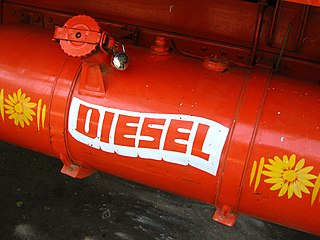
Diesel fuel, also called diesel oil or historically heavy oil, is any liquid fuel specifically designed for use in a diesel engine, a type of internal combustion engine in which fuel ignition takes place without a spark as a result of compression of the inlet air and then injection of fuel. Therefore, diesel fuel needs good compression ignition characteristics.

Biofuel is a fuel that is produced over a short time span from biomass, rather than by the very slow natural processes involved in the formation of fossil fuels, such as oil. Biofuel can be produced from plants or from agricultural, domestic or industrial biowaste. The climate change mitigation potential of biofuel varies considerably, from emission levels comparable to fossil fuels in some scenarios to negative emissions in others. Biofuels are mostly used for transportation, but can also be used for heating and electricity. Biofuels are regarded as a renewable energy source.

Biodiesel is a form of diesel fuel derived from plants or animals and consisting of long-chain fatty acid esters. It is typically made by chemically reacting lipids such as animal fat (tallow), soybean oil, or some other vegetable oil with an alcohol, producing a methyl, ethyl or propyl ester by the process of transesterification.
Heating oil is any petroleum product or other oil used for heating; a fuel oil. Most commonly, it refers to low viscosity grades of fuel oil used for furnaces or boilers use for home heating and in other buildings. Home heating oil is often abbreviated as HHO.
Ipiranga is a Brazilian fuel company and is a subsidiary of Ultra. It is the second-largest Brazilian fuel distribution company, and the largest in the private sector.
Vegetable oil can be used as an alternative fuel in diesel engines and in heating oil burners. When vegetable oil is used directly as a fuel, in either modified or unmodified equipment, it is referred to as straight vegetable oil (SVO) or pure plant oil (PPO). Conventional diesel engines can be modified to help ensure that the viscosity of the vegetable oil is low enough to allow proper atomization of the fuel. This prevents incomplete combustion, which would damage the engine by causing a build-up of carbon. Straight vegetable oil can also be blended with conventional diesel or processed into biodiesel, HVO or bioliquids for use under a wider range of conditions.

This article describes the use and availability of biodiesel in various countries around the world.

Delek US Holdings, Inc. is a diversified downstream energy company with assets in petroleum refining, logistics, asphalt, renewable fuels and convenience store retailing headquartered in Brentwood, Tennessee.
Clean Fuels Alliance America (CFAA), formerly known as the National Biodiesel Board, is an American commercial trade association representing the biodiesel industry as the unifying and coordinating body for research and development in the United States. Its mission is to advance the interests of members by creating sustainable biodiesel industry growth. CFAA works to remove barriers to the industry and educate the public about biodiesel. It offers regulatory, technical, communications, education, and petroleum outreach programs.
The United States produces mainly biodiesel and ethanol fuel, which uses corn as the main feedstock. The US is the world's largest producer of ethanol, having produced nearly 16 billion gallons in 2017 alone. The United States, together with Brazil accounted for 85 percent of all ethanol production, with total world production of 27.05 billion gallons. Biodiesel is commercially available in most oilseed-producing states. As of 2005, it was somewhat more expensive than fossil diesel, though it is still commonly produced in relatively small quantities.
Renewable Fuels are fuels produced from renewable resources. Examples include: biofuels, Hydrogen fuel, and fully synthetic fuel produced from ambient carbon dioxide and water. This is in contrast to non-renewable fuels such as natural gas, LPG (propane), petroleum and other fossil fuels and nuclear energy. Renewable fuels can include fuels that are synthesized from renewable energy sources, such as wind and solar. Renewable fuels have gained in popularity due to their sustainability, low contributions to the carbon cycle, and in some cases lower amounts of greenhouse gases. The geo-political ramifications of these fuels are also of interest, particularly to industrialized economies which desire independence from Middle Eastern oil.
Biofuel is fuel that is produced from organic matter (biomass), including plant materials and animal waste. It is considered a renewable source of energy that can assist in reducing carbon emissions. The two main types of biofuel currently being produced in Australia are biodiesel and bioethanol, used as replacements for diesel and petrol (gasoline) respectively. As of 2017 Australia is a relatively small producer of biofuels, accounting for 0.2% of world bioethanol production and 0.1% of world biodiesel production.

Biodiesel is commercially available in most oilseed-producing states in the United States. As of 2005, it is more expensive than petroleum-diesel, though it is still commonly produced in relatively small quantities.
Hydrotreated vegetable oil (HVO) is a biofuel made by the hydrocracking or hydrogenation of vegetable oil. Hydrocracking breaks big molecules into smaller ones using hydrogen while hydrogenation adds hydrogen to molecules. These methods can be used to create substitutes for gasoline, diesel, propane, kerosene and other chemical feedstock. Diesel fuel produced from these sources is known as green diesel or renewable diesel.

China Petrochemical Corporation or Sinopec Group is the world's largest oil refining, gas and petrochemical conglomerate, administered by SASAC for the State Council of the People's Republic of China. It is headquartered at Chaoyangmenwai in Beijing, across the road from the headquarters of fellow state-owned oil company and competitor CNOOC Group.

The use of biofuels varies by region. The world leaders in biofuel development and use are Brazil, United States, France, Sweden and Germany.

SG Biofuels is a privately held bioenergy crop company, which grows and researches Jatropha curcas for the production of biodiesel, bio jet fuel, and specialty chemicals.

Energy in the U.S. state of Hawaii is produced from a mixture of fossil fuel and renewable resources. Producing energy is complicated by the state's isolated location and lack of fossil fuel resources. The state relies heavily on imports of petroleum. Hawaii has the highest share of petroleum use in the United States, with about 62% of electricity coming from oil in 2017. As of 2021 renewable energy made up 34.5%.
United States vs. Imperial Petroleum is a federal criminal case in which Imperial Petroleum and others are accused of passing off RIN-stripped B99 as pure biodiesel.










